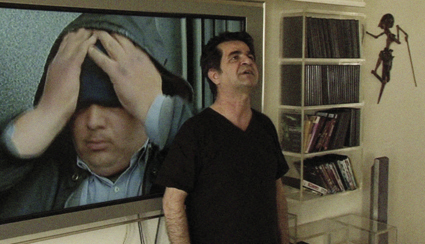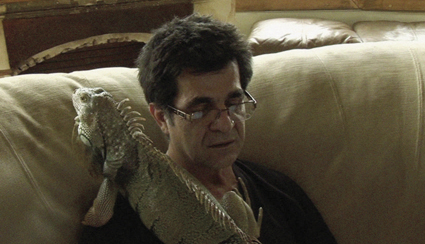iran: cinematic defiance from a prison home
dan edwards: jafar panahi’s this is not a film

Jafar Panahi, This is Not a Film
IF MANY AUSTRALIANS WRITE OFF CINEMA AS MERE ENTERTAINMENT, DICTATORIAL REGIMES ARE MORE CONVERSANT WITH THE POWER OF FILMS TO MAKE US THINK, FEEL AND SOMETIMES ACT. WHICH IS WHY SUCH REGIMES PLACE SPECIAL EMPHASIS ON CONTROLLING THEIR FILMMAKERS—AN INCREASINGLY TOUGH TASK IN THE DIGITAL AGE, AS IRANIAN DIRECTOR JAFAR PANAHI SHOWS WITH THIS IS NOT A FILM.
Panahi is one of Iran’s best-known directors, whose neorealist-inspired portraits of contemporary Iranian life have garnered numerous awards globally, including the Golden Lion at Venice for The Circle in 2000. In July 2009 he was arrested for his support of protesters killed following Iran’s disputed presidential election earlier that year, and eventually sentenced to six years in prison. More crushingly for an artist of Panahi’s standing, he was also banned from making films or leaving Iran for two decades.
While under house arrest pending the outcome of his appeal in March this year, the frustrated director began filming his daily routine with a video camera. Quickly concluding these self-conscious observations of his own confinement were “a lie,” Panahi invited his friend and fellow filmmaker Mojtaba Mirtahmasb to his apartment to help out, and began describing the film he was making at the time of his arrest. Ironically the aborted project was a tale of frustrated ambitions, about a young girl locked up by her family. Determined to leave some record of this unfinished work, Panahi lays out a set on his living room floor using gaffer tape and takes Mirtahmasb through the opening scenes of the script.
Until he suddenly stops and lowers his head.
“What’s wrong?” Mirtahmasb asks from behind the camera.
“Wait a moment,” Panahi replies. After a pause he starts talking again, but gives up after a few words, muttering “If we could tell a film, then why make a film?” Overcome, he quietly swears and disappears into the other room.
Panahi’s description of his unmade drama is punctuated by tales of other forcibly abandoned projects. This sad litany of unrealised dreams reminds us that the inhumanity of dictatorial regimes lies not only in the cruelties they inflict, but also in the possibilities they forestall. For all Panahi’s frustrations, however, there is a kind of victory in the fact that we can watch these scenes in a cinema far from Iran. As Mirtahmasb comments at one point, in the present situation the most important thing is to keep the cameras rolling and create a record of what’s happening—even if it’s a document of enforced inactivity. As they talk, Mirtahmasb urges Panahi to pull out his iPhone and start shooting his act of filming. “It’ll be a record of me if I get arrested,” Mirtahmasb says with a nervous laugh.
Then, unexpectedly, a small drama intrudes from the outside. As Mirtahmasb departs, a young man calls in to collect the garbage, and Panahi decides to follow him on his rounds. For viewers, even a move to the elevator feels like a kind of freedom after more than an hour in the apartment.

Jafar Panahi, This is Not a Film
As they go from floor to floor, Panahi chats with the good-natured garbage man, who recalls being present the night the director was arrested. “What happened?” Panahi asks, but the man’s memories are comically interrupted every few seconds as he darts out to collect the rubbish on each landing. In the end he never gets past the opening lines of his story.
The moment of light-hearted flight is brief. When the elevator reaches the basement car park, the young man heads out to the street with his wheelie bin, warning Panahi not to follow: “They’ll see you with the camera.” The director is left to frame the obscured view of a bonfire burning outside the gate. We know from earlier conversations this is a New Year celebration, but the flickering light fed by gasoline is eerily reminiscent of scenes from the civil unrest that led to Panahi’s current situation.
It hardly matters whether everything we see in This is Not a Film is a setup or the spontaneous interaction with reality we’re led to believe. Panahi is, after all, a master at searing his dramas with the spark of reality. This may not be the project Panahi would choose to make, but it’s an emotional and engaging act of cinematic defiance from an imagination confined. In May the film was smuggled out of Iran on a USB stick and unveiled at Cannes. Yet even as his images have taken flight Panahi remains in detention, and This is Not a Film probably feels like a pyrrhic victory for the director. In September his collaborator Mojtaba Mirtahmasb was arrested, and the following month Panahi lost his appeal. If it’s true thst films can help shape the world, it’s equally true that images alone cannot stop a determined regime, even in the age of digital protest.
–
This is Not a Film, directors Jafar Panahi & Mojtaba Mirtahmasb, Iran, 2011
RealTime issue #107 Feb-March 2012 pg. 24






